1st Graders Explore the Busy World of Bees!!!
go.ncsu.edu/readext?867145
en Español / em Português
El inglés es el idioma de control de esta página. En la medida en que haya algún conflicto entre la traducción al inglés y la traducción, el inglés prevalece.
Al hacer clic en el enlace de traducción se activa un servicio de traducción gratuito para convertir la página al español. Al igual que con cualquier traducción por Internet, la conversión no es sensible al contexto y puede que no traduzca el texto en su significado original. NC State Extension no garantiza la exactitud del texto traducido. Por favor, tenga en cuenta que algunas aplicaciones y/o servicios pueden no funcionar como se espera cuando se traducen.
Português
Inglês é o idioma de controle desta página. Na medida que haja algum conflito entre o texto original em Inglês e a tradução, o Inglês prevalece.
Ao clicar no link de tradução, um serviço gratuito de tradução será ativado para converter a página para o Português. Como em qualquer tradução pela internet, a conversão não é sensivel ao contexto e pode não ocorrer a tradução para o significado orginal. O serviço de Extensão da Carolina do Norte (NC State Extension) não garante a exatidão do texto traduzido. Por favor, observe que algumas funções ou serviços podem não funcionar como esperado após a tradução.
English
English is the controlling language of this page. To the extent there is any conflict between the English text and the translation, English controls.
Clicking on the translation link activates a free translation service to convert the page to Spanish. As with any Internet translation, the conversion is not context-sensitive and may not translate the text to its original meaning. NC State Extension does not guarantee the accuracy of the translated text. Please note that some applications and/or services may not function as expected when translated.
Collapse ▲All four first grade classes at Murphy Elementary school participated in the 4-H school enrichment program, Busy World of Bees. Students in Mrs. Stonecypher’s, Mrs. Wood’s, Mrs. Flowers’, and Mrs. Savugot’s classrooms completed 7 lessons on honey bees and other pollinators. Arleene Ward, Cherokee County Extension Master Gardener℠ and 4-H School Enrichment Volunteer, taught the program to the first graders. Arleene is a retired teacher and does a great job teaching the curriculum to the students.
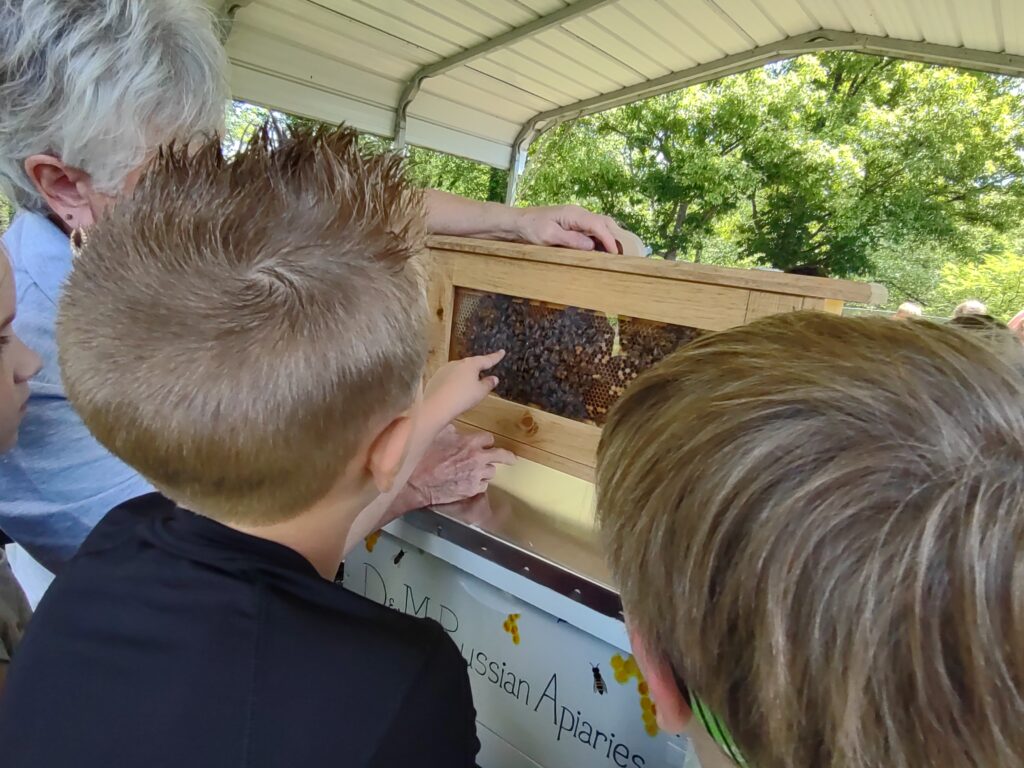
Darlene Myers pointing out the queen honey bee to some 1st grade students.
The Busy World of Bees is one of NC 4-H’s school enrichment programs. This curriculum helps students celebrate bees and other pollinators and helps build an understanding of the benefits of bees and other pollinators to humans. Students discover that the honey bee is one of nature’s wonders and that native bees and honey bees help produce delicious, healthy food that humans have been eating for thousands of years. From juicy watermelon, and crunchy apples, to delicious summer squash, nearly one out of every three bites we eat depends on bee pollination.
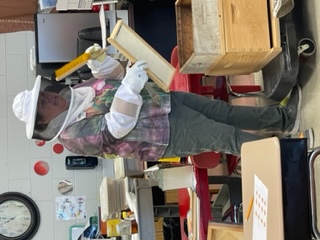
Cherokee County 4-H Agent, Shannon Coleman, demonstrating some of the beekeepers equipment.
Students learned about the needs of bees including air, water, light, shelter
(nest or hive), and food sources (nectar and pollen) all while exploring specific
examples of how the environment provides a habitat for honey bees and
other pollinators. They learned about the honey bees anatomy and learned the life cycle of the honey bee and other insects.
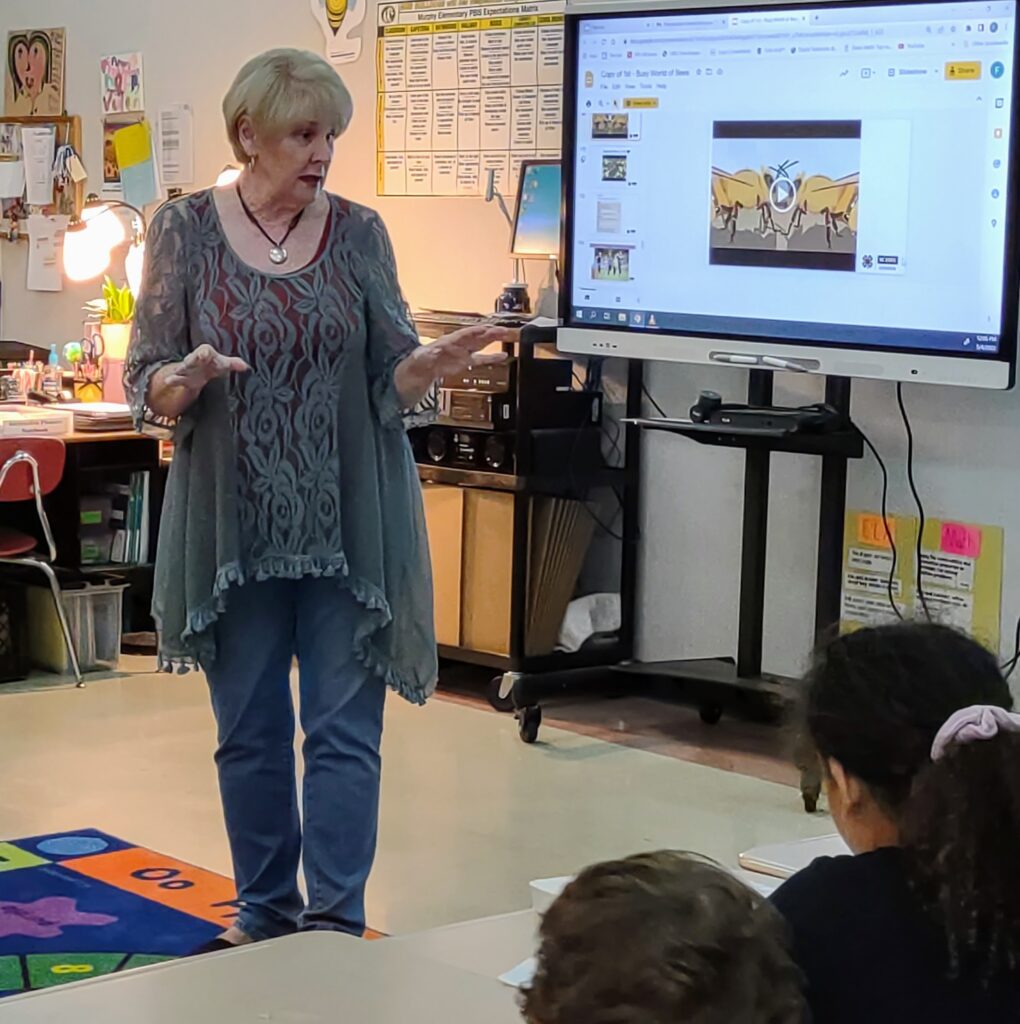
Arleene Ward, 4-H Volunteer, teaching about how bees communicate.
The participants played games and learned dances to mimic how the honey bees communicate with other honey bees in the hive. Through the different “dances” that the honey bees perform, the students learned that the honey bees were communicating the direction and distance from the hive where other bees could forage for food and in turn pollinate the plants they were visiting.
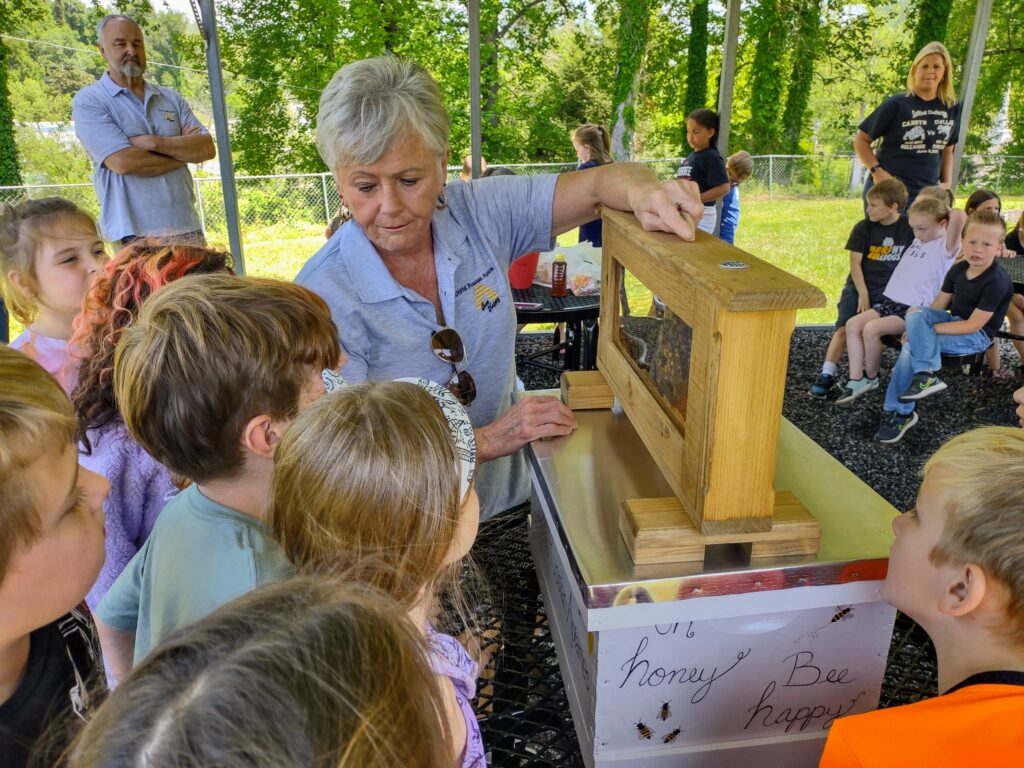
Darlene and Mitch Myers talking about their honey bees with the students.
Students learned about different habitats that honey bees, other bees, and other pollinators live in. They explored how they can help honey bees and other pollinators. Students tasted different types of honey including some local honey. Each student planted a squash seed to take home to their families in a plant-able pot so they could give the bees something to forage from and their families got a healthy vegetable to eat.
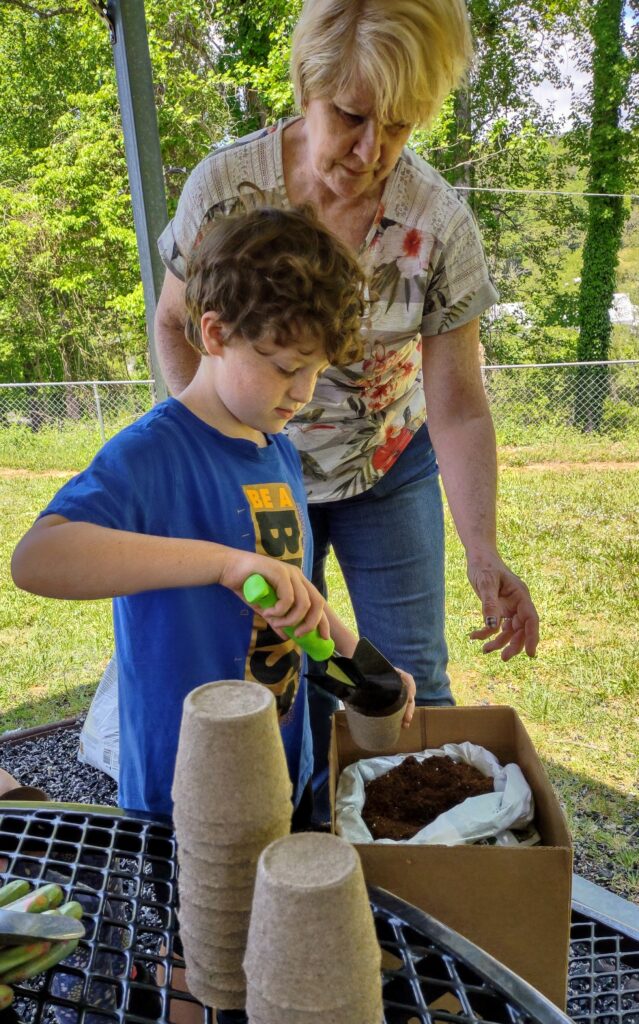
Arleene Ward, 4-H Volunteer, and Wyatt Miller, first grader at Murphy Elementary School planting his squash plant.
Local beekeepers Mitch and Darlene Myers, came to visit the students and brought with them a bee frame with live honey bees enclosed in a glass case so that students could observe working bees. The students were able to see the queen bee laying eggs and the worker bees busy doing their jobs. The Myers’ also brought some of their wildflower honey with them for the students to try.
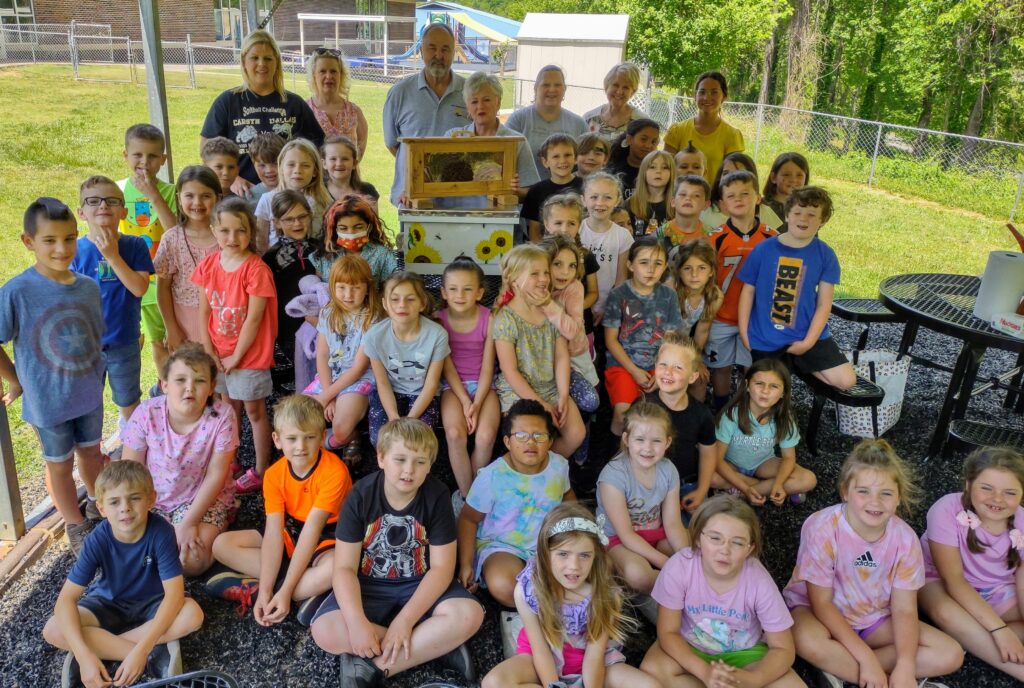
Mitch and Darlene Myers with all four first grade classes at Murphy Elementary School showing off their wonderful honey bees.
During the last class, the students made bee stewardship bracelets with each bead representing the bees and their needs.
- Black and yellow beads represented bees. Not all bees are black and
yellow, but many of them are, and these colors can be a reminder of
our important pollinating friends. - Purple and violet beads represented flowers. Native flowers planted in
clumps that flower throughout the year will help bees have enough
nectar and pollen for food. - Blue beads represented water, which all living things need live. Make sure
that bees have access to good water. - Gold beads represented sunlight. Bees need the sun for warmth to fly.
Healthy plants also require sunlight for photosynthesis to produce
food for themselves and oxygen for bees (and other animals!). - Green beads represented other plants. Many bees need the hollow stems
of grasses for nesting, but bees also use plants as places to rest. Other
plants provide resin for honey bees to use to protect their hives. - Brown beads represented the soil. The soil not only provides a place for
nectar plants to grow; it provides a nesting site for many native bees. - Silver beads represented air. Air is a precious natural resource that is
all around us. The air we breathe–the air bees breathe–can become
polluted from many sources and must be protected.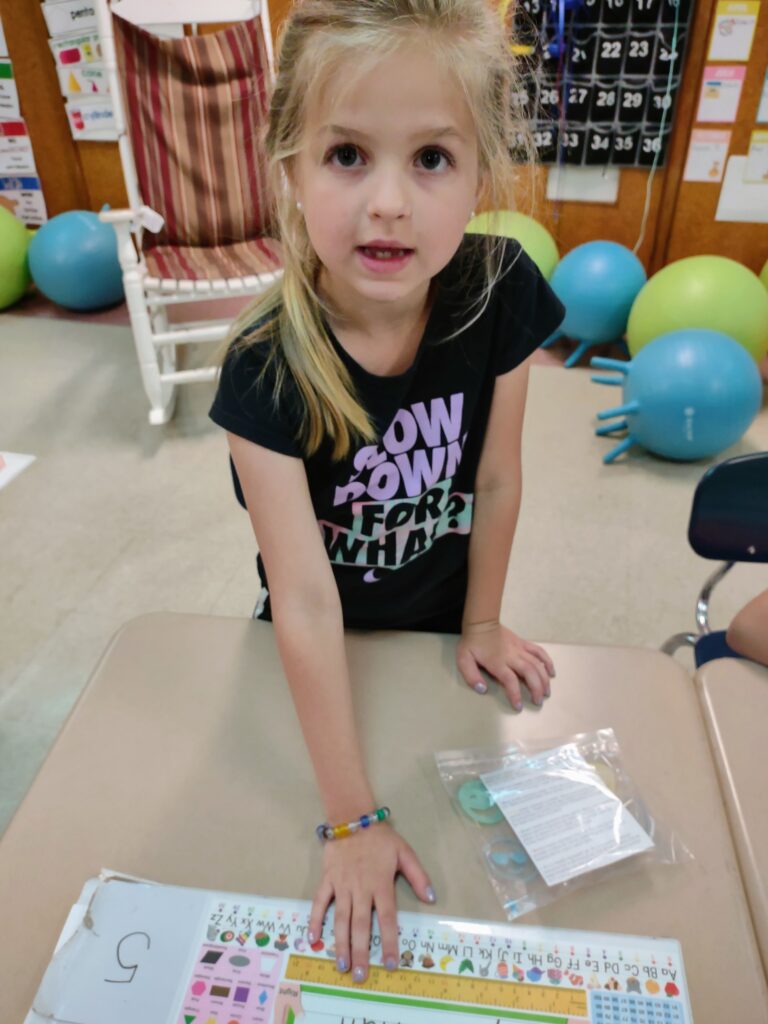
Dylan Hall showing off her bee stewardship bracelet.
If you would like to know more about this curriculum or any of our 4-H curriculum or you are a teacher and would like more information about 4-H school enrichment curriculum contact Cherokee County 4-H Extension Agent Shannon Coleman. If you would like to volunteer as a 4-H school enrichment program presenter like Arleene, contact Shannon Coleman, by emailing shannon_coleman@ncsu.edu or call 828-837-2210 ext. 4.




